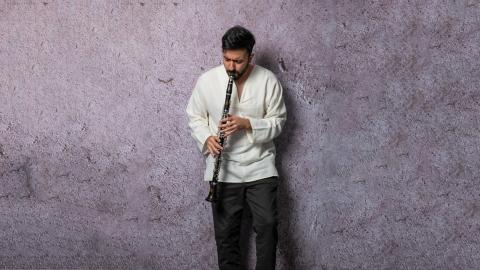The Clarinet Prodigy: Serkan Hakki MM ’24’s Journey from Aleppo, Syria, to International Acclaim

Serkan Hakki
Image courtesy of Serkan Hakki
Clarinetist, composer, and music producer Serkan Hakki MM ’24 has developed a distinctive voice across the Arab and Turkish music scenes. Born and raised in Aleppo, Syria, and now based in Istanbul, his journey is one of self-determination, deep cultural roots, and boundary-pushing creativity. Today, Hakki is regarded as one of the most promising pioneers of contemporary clarinet music.
The talented musician’s love for music began with classical piano, but it was the clarinet and, later, the expressive world of Arabic maqam—a rich system of melodic modes used in traditional Middle Eastern music—that captured his heart. His true calling came unexpectedly when he picked up a B-flat clarinet that had been abandoned by his older brother, who had given up on the instrument. “I spent hours and hours teaching myself the clarinet in the basement of our building,” he recalls. With no formal training, he remained entirely self-taught until his first official class at Berklee Valencia.
In 2024, Serkan completed his Master of Music in Contemporary Performance (Production Concentration (CPPD) at Berklee Valencia, where his exposure to jazz, flamenco, and Mediterranean sounds helped him evolve, not by replacing his identity, but by refining it. “Berklee Valencia was exactly where I needed to be. Mediterranean vibes, mixing jazz, flamenco, Arabic, Turkish, whatever you’re interested in—it’s all there on that campus.” For the clarinet prodigy, attending Berklee was a deep dive into musical innovation, marked by collaborations with artists from around the world.
"Maybe one of the reasons I chose to play the clarinet was because I didn’t like my voice when I was a kid. I just wanted to simulate the voice of a human through this instrument."Serkan Hakki MM ’24
His most recent album, Inner Journey, was recorded entirely at the Berklee Valencia studios. The album serves as a soundtrack to 10 years of exile, immersion, and transformation marked by war, migration, and resilience. A reflection of his own real-life stories, the record fuses maqam, jazz, and experimental textures. “It’s about how an artist can leave a country with only his clothes and his instrument,” Hakki explains. “It’s also about the identity crisis I had. I’m the son of a Kurdish family from Afrin, but I was born and raised in Aleppo and then had to flee Syria because of the war.”
Over the past five years, Hakki has focused on integrating the clarinet into Arabic music, bridging traditional sounds with modern production. He has worked as a producer and musical director with iconic artists, such as Ali Elmedydy, Kazem El Saher, and major talents across the Middle East and North Africa, from Morocco to the Gulf.
Now, Hakki is preparing for a bold new chapter: a move to Dubai after receiving a prestigious 10-year artist residency, granted by the UAE’s Ministry of Culture in recognition of his contributions to regional music.
Driven by his passion for maqam, he is dedicated to spreading awareness about its intricate musical language and cultural depth. “One of my missions at Berklee Valencia was to tell people: maqam is accessible, but don’t oversimplify it,” he says. “Respect its identity. Don’t try to reshape it into something it’s not, like Western classical music.”
He emphasizes that understanding maqam starts with listening most of all, not just studying theory. “Turkish and Arabic music differ in theory and tuning. You have to listen first, feel the music, then learn the theory. That’s where it begins and that’s my best piece of advice to musicians interested in maqam,” he adds.
In addition to composing and producing, Hakki has also put his entrepreneurial spirit into action, actively building bridges between musical communities. In 2021, he launched In The Studio Project, an innovative initiative that connects independent musicians worldwide through immersive, in-studio headphone concerts. Designed as a hybrid between a recording session and a live performance, the project creates an intimate space for artists and audiences to engage with music on a deeper level. It’s a visionary step toward redefining how we experience sound and artist connection.
Today, Hakki is expanding his efforts across the Middle East, planning workshops in Saudi Arabia, the UAE, and Bahrain. “These countries have a deep appreciation for the clarinet,” he notes, “but little access to academic resources on the instrument in the context of Arabic music. I want to change that, especially by exploring the clarinet’s role in maqam and opening new possibilities for its future.”
From those early days of playing the clarinet in his basement to becoming a globally recognized artist reshaping the role of the clarinet in Arabic music, Hakki’s path reflects both resilience and vision. With deep cultural roots and a forward-thinking spirit, he continues to connect tradition, innovation, and community, one note at a time.
